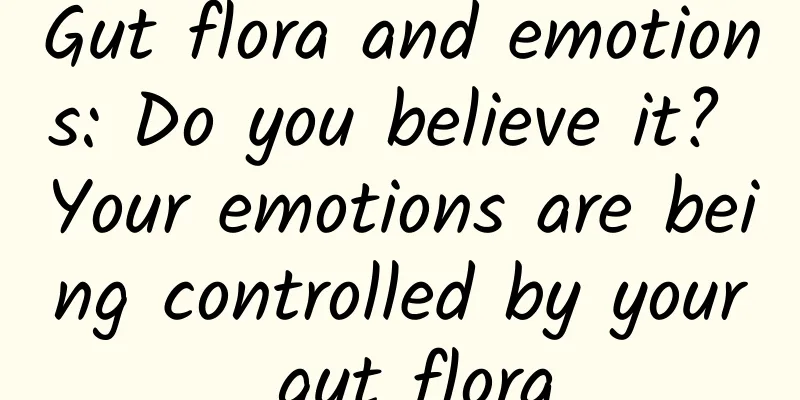Gut flora and emotions: Do you believe it? Your emotions are being controlled by your gut flora

|
Mental illnesses that threaten our mental and physical health are gradually being understood and taken seriously. There are quite a few patients with depression and anxiety, the two most common mental illnesses, and many people are suffering from mental illnesses. According to the People's Daily, nearly a quarter of Chinese teenagers were diagnosed with depression in 2020, and some of them have been in a long-term low mood. There are currently nearly 100 million people suffering from depression in my country, and more than 100,000 people commit suicide due to depression every year. Depression is different from depressive mood. It is not something that can be cured by simply relaxing or talking to someone. Instead , it is a disease caused by the combined effects of genetic factors, neurochemical factors, and psychosocial factors (such as being under great stress for a long time), which requires drug treatment. The core symptoms of depression are a depressed mood (feeling sad, irritable, empty) or loss of interest and pleasure . If you have long-term fatigue, slow reaction, slow movement, irritability, indecision, decreased ability to concentrate and think, low self-esteem, excessive self-blame, guilt, repeated thoughts of death or suicidal or self-harming behaviors, insomnia almost every day, early awakening, or excessive sleep, you should examine whether you have depression. Like other diseases, depression needs to be treated. The main treatments currently include psychotherapy and antidepressant medication. However, antidepressants are not suitable for children and adolescents. Even when used to treat adults, they have shortcomings such as slow onset, low cure rate, and easy relapse. In addition, these drugs have side effects. Long-term use by adults can easily add burden to the body and even cause drug dependence and abuse. Currently, researchers and doctors are still exploring better treatments. When you are in a bad mood, you always want to eat something delicious or dessert. These delicacies can often stimulate the secretion of dopamine and make people feel short-term happiness. In fact, eating well is not only to feed ourselves, but also to nourish our intestinal flora. Healthy intestinal flora may have a longer-term impact on stable and positive emotions, and also have a positive effect on the treatment of depression. Scientists have long discovered that the composition of the human intestinal flora is closely related to the incidence and severity of mental illnesses such as depression and anxiety. More importantly, scientists have launched clinical trials to improve depression symptoms by performing fecal microbiota transplants or supplementing probiotics in patients with depression. In fact, scientists have long discovered that the intestines and the brain have been in "two-way communication" , which scientists call the gut-brain axis . Have you ever experienced a very tense moment, such as before an exam or an interview, when you suddenly want to go to the toilet? This is the nerves regulating the intestines to make a motor response. In turn, the intestinal flora can also remotely regulate the state and function of brain cells. First, the metabolites produced by the intestinal flora when breaking down food are the energy source for brain cells. Certain special metabolites, such as short-chain fatty acids (SCFA), change the metabolic pathways of brain cells and the interaction between neurons. Secondly, the intestinal flora can also release or stimulate intestinal endothelial cells to release neurotransmitters and increase the response between neurons. This is also the mechanism of action of some antidepressants. With the existence of the gut-brain axis, it is not surprising that changes in the intestinal flora affect neurological diseases. Many research teams have collected feces from patients with depression and compared the differences in the bacterial composition between them and healthy people. Some teams have found that the proportion of bacteria belonging to the phyla Bacteroidetes, Proteobacteria and Actinobacteria in the feces of patients with depression is higher, while the proportion of Firmicutes, especially Lactobacillus and Bifidobacterium, which are considered to be beneficial to health, is lower. Comparison of metabolites in the intestines found that the tryptophan level in the intestines of patients with depression was significantly lower than that of healthy people. Although the differences in bacterial flora composition discovered by each research team were not the same, they all came to the same conclusion that the intestinal flora composition of patients with depression is different from that of healthy people. The former lacks diversity and even presents a state of bacterial flora disorder. Some patients with depression even have increased intestinal epithelial cell permeability, which allows more toxins and even bacteria and viruses to enter the blood circulation, bringing systemic effects and triggering immune responses. This is why patients with depression show higher inflammatory factors. Here we have to ask, is it depression that comes first and then the intestinal flora changes, or is depression caused by the imbalance of intestinal flora ? In other words, the question of which came first, the chicken or the egg. In fact, this problem exists in most studies on the correlation between intestinal flora and diseases. Scientists will resort to animal experiments at this time, such as transferring intestinal flora from patients and intestinal flora from healthy people to clean germ-free rats, and comparing the progression of the rat disease. In the study of depression, it was found that when the intestinal flora from patients with depression was transferred to germ-free rats, these rats also showed symptoms of depression, as well as higher inflammatory factors. Scientists then used animal experimental models to treat rats with depression with oral probiotics, and found that certain strains of Lactobacillus and Bifidobacterium could relieve tension and reduce depression. Based on these findings and experiments, scientists have begun to try to combine fecal microbiota transplantation or probiotics or supplement specific metabolites to treat depression. In a small clinical study just published, researchers and doctors gave patients with depression tablets containing 8 probiotics while taking antidepressants. After 31 days of treatment, the level of depression and symptoms of these patients were much lower than that of the control group taking only antidepressants. Not only that, the composition of the intestinal flora of patients taking probiotics also changed, with higher lactobacilli compared to the control group. At the same time, the activity of emotion-related neurons in the brains of patients taking antidepressants and probiotics also changed. Another study gave 25 patients with depression or anxiety a high-tryptophan or low-tryptophan diet, and only four days of high-tryptophan diet treatment significantly improved the patients' mood levels. Although these two clinical trials failed to cause lasting changes in the composition of the intestinal flora, and the research period was short and the number of patients was small, this type of research provides us with new ideas and hope for the treatment of depression. In addition to the above clinical trials, scientists are also trying to combine oral probiotics with improved dietary structure to help patients with depression build healthy intestinal flora. However, the current research on fecal microbiota transplantation or probiotics for the treatment of neurological diseases is still in its infancy. It is necessary not only to improve the success rate of microbiota transplantation, but also to expand the scale of research and the number of participants to obtain sufficiently reliable data. In addition, there are still many clinical data to be collected, such as whether the addition of probiotics can increase the level of brain neurotransmitters? Can these intestinal flora-derived neurotransmitters really regulate emotions, or how much the neurotransmitter level needs to increase before it can really work? It should also be noted that due to the presence of a blood-brain barrier in the brain , many small molecules or metabolites that enter the blood may not be able to enter the brain environment and act on brain neurons. It is difficult to determine whether supplementing metabolites directly or indirectly regulates neuronal activity. Therefore, more mechanism-related research still needs to be proven by animal experiments and clinical trials. Not only depression, the composition of the intestinal flora is related to many emotional manifestations and other brain diseases, such as the perception of stress, pain, anxiety, and even the occurrence and development of neurodegenerative diseases such as Alzheimer's disease. This time we have learned about the knowledge related to the gut-brain axis, but how do the intestines and the brain communicate specifically? Can regulating the intestinal flora bring new hope for the treatment of more neurological diseases such as Alzheimer's disease, Parkinson's disease, autism, etc.? Interested friends can continue to pay attention. 1. Schaub, AC., Schneider, E., Vazquez-Castellanos, JF et al. Clinical, gut microbial and neural effects of aprobiotic add-on therapy in depressed patients: a randomized controlled trial. Transl Psychiatry 12, 227(2022). 2. YunTeng, Jingyao Mu, Fangyi Xu, et al., Gut bacterial isoamylamine promotes age-related cognitive dysfunction by promoting microglial cell death, Cell Host& Microbe, Volume 30, Issue 7, 2022. 3. LindsethG, Helland B, Caspers J. The effects of dietary tryptophan on affectivedisorders. Arch Psychiatr Nurs. 2015;29(2):102-107. 4. SaulnierDM, Ringel Y, Heyman MB, et al. Theintestinal microbiome, probiotics and prebiotics inneurogastroenterology. Gut Microbes. 2013;4(1):17-27. (Cover image from the Internet) This article is produced by the Science Popularization China **** Creation Cultivation Program. Please indicate the source when reprinting. |
<<: You're throwing away the most nutritious part of the celery!
>>: The African guy's arms are tanned. How can he effectively avoid the scorching sun this year?
Recommend
WeChat is getting more and more powerful, but these functions are getting worse and worse
After the WeChat subscription account revamped it...
[Creative Cultivation Program] Why don’t you spit out the grape skins when eating grapes?
Author: Lao Ke opens his mind Audit: Superb There...
iQIYI Android client startup optimization and analysis
1 Introduction There is an eight-second rule in t...
China Passenger Car Association: Wuling Hongguang MINI EV sold 41,255 units in October 2022, a year-on-year decrease of 13.8%
The China Passenger Car Association released the ...
WeChat Youth Mode has been upgraded! The first guardian authorization function is launched
[[428163]] Do you want to flexibly set the conten...
How do mini program development companies and mini program agents make profits?
How do mini program development companies and min...
What types of videos on Tik Tok are likely to go viral? What are the reasons why Douyin does not recommend it?
What types of videos on Tik Tok are likely to go ...
Why is it said that new energy vehicles will definitely be led by China?
The world is entering the era of electrification,...
From point A to point B, the ant walks in a straight line? It's actually Brownian motion
Produced by: Science Popularization China Author:...
How to master fission growth?
There is an old saying: Three incompetent general...
Brand Marketing: 5 Principles of Brand Naming
First, McDonald's name change to "Golden...
As marketing skills become more popular, how do strategists implement them?
There was once an ultimate question popular in th...
The "fluffiest planet ever" looks like cotton candy!
Marshmallow planet on a cat dwarf: a quirky and a...
Why do more people with lung cancer get worse in winter? How can lung cancer patients spend the winter safely? Pay attention to these 6 details
Winter is the most difficult season for lung canc...
Can the unused electricity be stored?
This summer, Sichuan has been experiencing contin...









